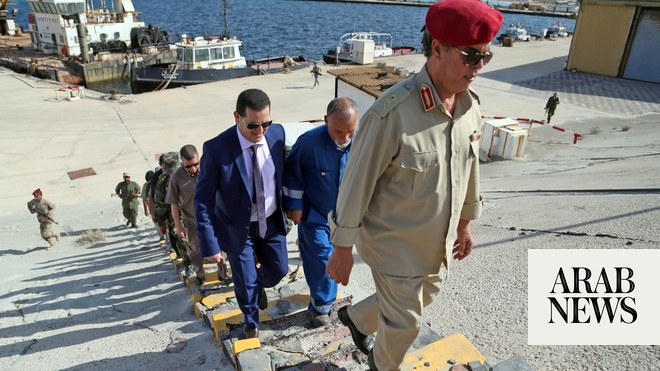
Libyan National Army says it had regained “full control” of oil crescent.
Haftar supports administration in the east that opposes government in Tripoli.
BENGHAZI: Libyan commander Khalifa Haftar will transfer control of oil ports recently recaptured by his forces to the administration in eastern Libya he supports, a spokesman for the field marshal said Monday.
Haftar’s announcement came just hours after his Libyan National Army said it had regained “full control” of the country’s oil crescent after driving a rival militia out of the area.
“All the oil installations controlled by (Haftar’s) Libyan National Army are being handed over to the National Oil Corporation dependent on the provisional eastern government and that is headed by Faraj Al-Hassi,” spokesman Ahmad Al-Mesmari said.
Haftar supports an administration based in Libya’s east that opposes the internationally recognized government in Tripoli.
The LNA already announced last Thursday that it had recaptured the Ras Lanuf and Al-Sidra terminals, a week after they were seized by armed groups led by militia leader Ibrahim Jadhran, although military operations in the area were unfinished.
Jadhran’s Petroleum Facilities Guard controlled the two key oil ports for years following the 2011 NATO-backed removal of Muammar Qaddafi — but they were eventually forced out by the LNA in September 2016.
The spokesman Mesmari said oil revenues from the four terminals now under LNA control would be handled by the administration in the east supported by Haftar.
Haftar made the decision after realizing “rival armed groups are financed by oil revenues secured by the LNA,” Mesmari said, referring to Jadhran’s forces.
Up until now, the terminals have been managed by the National Oil Company tied to Libya’s internationally recognized government based in Tripoli.
The NOC is chaired by Mustafa Sanalla, who represented Libya last week at an OPEC meeting in Vienna.
Clashes between Jadhran’s forces and the LNA in the oil crescent pushed the NOC on June 14 to suspend exports from terminals in the area, warning of billions of dollars in losses.
After visiting the Ras Lanuf terminal on Sunday, the NOC said violence had slashed oil production by almost half and cost billions of dollars in losses.
Libya’s economy relies heavily on oil, with production at 1.6 million barrels per day under Qaddafi.
The uprising that led Qaddafi’s demise saw production fall to about 20 percent of that level, before recovering to more than one million barrels per day by the end of 2017.












